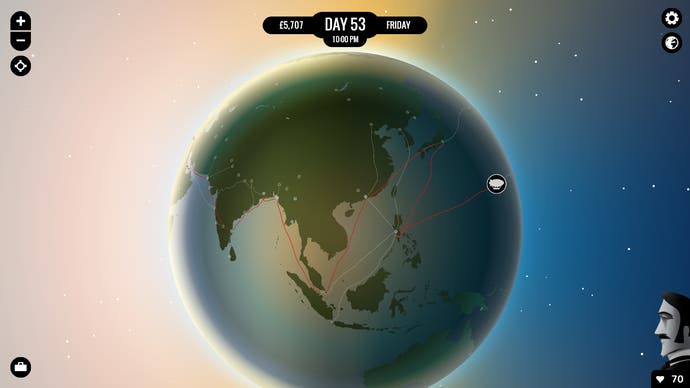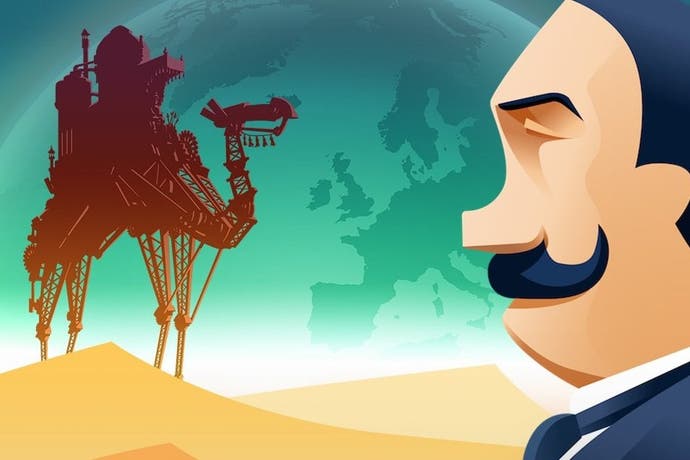80 Days review
Monumental valet.
At Kent, after travelling through countryside untouched by progress, the train hits the English Channel and plunges into the freezing waters. We are somewhat put out by this, perhaps, but we sense that the master is not. Fogg is truly masterful - in the original, imperious sense of the word. He is also "untouched by place or circumstance", which is handy really, since his wager will take him around the world and in a terrible hurry. We hide our fear as the water races past, and maybe this is why our relationship strengthens slightly as a result. Perhaps it's not this, of course. Perhaps it's something else. Perhaps it's nothing at all.
80 Days reimagines Jules Verne's headlong dash across the globe as a steampunk affair - trains become submarines, mechanical horses draw carriages, and one city at least is a giant ambling automaton staggering, one clanking foot at a time, through the endless desert. It also reimagines it as a web, however, of consequence and interconnection, where you may pluck one string and see the spider move somewhere entirely different. This is the game part, and it revels in mystery. It's fitting: what is a trip around the world of the 19th century if not a journey into the unknown? And while the choices you make in most games traditionally require a clear sense of what you're actually picking between, 80 Days often does away with all that to thrilling effect. It's a headlong dash, after all: select the start of the next paragraph and see what happens.
It's interactive fiction at heart, each moment in the journey unfolding as a few lines of text, compact yet elegant, taking you further along your route or burning up precious minutes in a diversion. You talk on the road, and you talk in towns where you hole up between departures, either exploring the streets and getting into mischief, selling or buying items for strategic advantages, or haggling with train companies and boat companies and people who run steam carriages, asking them to move departure dates forward. Always forward! Every stop in a hotel feels like failure, but even this has value in truth, as Fogg's health takes a beating as he travels, and sleep, along with the occasional grooming from his valet, can restore it. You are not Fogg, of course. You are Passepartout, and nobody cares enough to monitor Passepartout's health. Fogg does nothing of use an awful lot of the time, and yet he is at the center of everything all the same, judging your actions, appraising your abilities. The whole thing is a delicate escort mission, a survival horror that frequently hinges on icy social niceties rather than monster closets.
Passepartout is an ideal role for the player, constantly rushing into the heart of the action, constantly moving from one disaster to the next. He is an ideal viewpoint from which to make the blind choices the game excels at delivering, too. On the road through Europe, driven by a fancy lady, do you want to take the reins for a minute or two? Of course! But an accident is waiting, and with it a delay. Okay, you could probably see that one coming, but only in retrospect, right? Like fiction. 80 Days is a game that prefers the rules of fiction to the rules of games.
Here's another choice: alone in a city at night while Fogg, presumably, slumbers in his rooms, Passepartout slips away and ends up in a bar where ladies are involved in a drinking game. Do you join them, or do you merely offer to keep count for them? All of a sudden, the strange heart of the enterprise starts to make sense. Like all travelogues, this is a character piece. As you make choices, you are not so much choosing what you want to happen, so much as choosing what kind of Passepartout you want something to happen to.
80 Days arrives on PC after great success on Android and iOS, and though I can understand arguments that the picaresque nature of the journey makes it more suited to smartphones, in truth what I like about 80 Days is its refusal to fit neatly into your life in little chunks whatever format it comes in. One thing always leads to another here, and the game takes an awkward amount of time for you to make an entire circuit of the globe. This seems like the point to me: that Fogg's wager is a bit of encumbrance for everybody. All of that aside, the arrival of the PC and Mac builds see all versions of the game getting a massive update anyway, adding new cities - and a couple of more fanciful destinations - and fleshing out parts of the globe that were missed originally. Plenty of additional writing, in other words, not that the original game scrimped. Elsewhere, the lighting has been improved and the text has been laid out afresh to look as comfortable as it can on a larger screen. It all works.

You're still in good hands here, then. Possibly better hands than you were with Verne who, after all, was only telling one story, while 80 Days tells hundreds. Each choice you make opens up new routes, which you then watch spreading across distant continents, new strands to the web. Each knot in the web is a paragraph, a possible diversion, a choice, and there is always Fogg to appraise you with a cold eye.
And there is often the choice to do nothing, too. To stay in. To avoid the sights. To travel cleanly and quickly and with a minimum of incident. I'd never really thought about it before, but Fogg's wager is stupid. Fogg is stupid. He wants to travel the world, but - initially at least - the only place he really wants to see again is London, and the only thing he wants to find there is victory. Empty victory, wager victory, the stupidest kind of victory.
80 Days understands this, and so when it lures you off the quickest path it is making its most important point. A cliche, certainly, but a good one: the journey is the thing that matters. All else is hollow distraction. Passepartout would like that kind of notion. He is a sentimental creature, after all. Fogg, meanwhile, might roll his eyes and check his watch again - and your relationship with him would deteriorate as a result.





